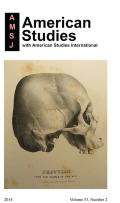Abstract
Scholars have devoted considerable attention to W. E. B. Du Bois’s graduate studies at the University of Berlin (1892-94), especially on his development as a sociologist. However, Gustav von Schmoller and other leaders of the Berlin “New Historical School of Economics” also developed in him a deep and abiding interest in what Thomas Carlyle called the “dismal science.” Indeed, no African American of the early twentieth century had a deeper knowledge of economic theory and practice than did Du Bois. Moreover, his economic education in Berlin laid the foundation for his analysis of the “Negro Problems” during his early career and his eventual turn to socialism. During the American progressive era he authored a significant number of publications that directly address economic issues affecting African Americans. Berlin New Historical Economic principles are inscribed in his two major books of the period: Souls of Black Folk (1903) and his first novel The Quest of the Silver Fleece (1911). Significantly, he described the latter as an “economic novel of some merit.” Du Bois not only embraced the Berlin principles of an economics based on ethics and social justice, he also attempted to influence the evolving discipline of economics in that direction and to combat the scientific racism that caused white economists to violate their most deeply held economic theories. He read papers at two American Economic Association (AEA) conferences, each time delivering a blistering indictment of AEA members for ignoring or rationalizing racial and economic injustice in the South. Du Bois’s overlooked economic texts and activities of the progressive era deserve recognition and further study.All items © Mid-America American Studies Association
Authors: If you prefer to remove your text(s) from this database please contact the editor.

